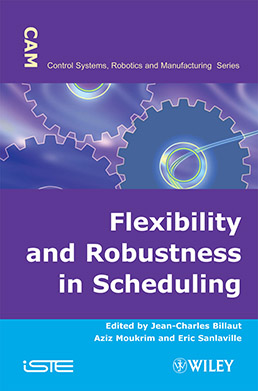
Scheduling is a diverse research area, and scheduling problems arise from many application domains, such as production systems, logistics and computer science. Solving scheduling problems requires the use and knowledge of tools such as combinatorial optimization and exact or approximated algorithms.
Flexibility is at the interface between predictive deterministic approaches and reactive or “on-line” approaches. It exists when some information (which may not be complete or perfect) about the problem is known, but which is fairly reliable and where it is likely that there will be a difference between the forecast plan and its execution. The purpose of flexibility is to provide one or more solutions tailored to the nature of the application in order to provide the ideal solution. Robustness is what characterizes the performance of an algorithm when data are subject to uncertainty, is defined as being able to be resistant to approximations and ignorance.
This book focuses on the integration of flexibility and robustness considerations in the study of scheduling problems. After considering both flexibility and robustness, it then covers various scheduling problems, treating them with an emphasis on either flexibility or robustness, or both.
1. Introduction to Flexibility and Robustness in Scheduling, Jean-Charles Billaut, Aziz Moukrim and Eric Sanlaville.
2. Robustness in Operations Research and Decision Aiding, Bernard Roy.
3. The Robustness of Multi-purpose Machine Workshop Configuration, Marie-Laure Espinouse, Mireille Jacomino, André Rossi.
4. Sensitivity Analyses for One and m Machines, Amine Mahjoub, Aziz Moukrim, Christophe Rapine and Eric Sanlaville.
5. Service Level in Scheduling, Stéphane Dauzère-Pérès, Philippe Castagliola and Chams Lahlou.
6. Metaheuristics for Robust Planning and Scheduling, Marc Sevaux, Kenneth Sörensen and Yann Le Quéré.
7. Metaheuristics and Performance Evaluation Models for the Stochastic Permutation Flow-shop Scheduling Problem, Michel Gourgand, Nathalie Grangeon, Sylvie Norre.
8. Resource Allocation for the Construction of Robust Project Schedules, Christian Artigues, Roel Leus and Willy Herroelen.
9. Constraint-based Approaches for Robust Scheduling, Cyril Briand, Marie-José Huguet, Hoang Trung La and Pierre Lopez.
10. Scheduling Operation Groups: A Multicriteria Approach to Provide Sequential Flexibility, Carl Esswein, Jean-Charles Billaut and Christian Artigues.
11. A flexible Proactive-reactive Approach: The Case of an Assembly Workshop, Mohamed Ali Aloulou and Marie-Claude Portmann.
12. Stabilization for Parallel Applications, Amine Mahjoub, Jonathan E. Pecero Sánchez and Denis Trystram.
13. Contribution to a Proactive/Reactive Control of Time Critical Systems, Pascal Aygalinc, Soizick Calves and Patrice Bonhomme.
14. Small Perturbations on Some NP-complete Scheduling Problems, Christophe Picouleau.
Jean-Charles Billaut is Professor in Computer Science in the Polytechnic School of the University of Tours, France. He teaches assembly language and operations research (graph theory and dynamic programming). He is also member of the board of the French OR Society (President in 2006 and 2007).
Aziz Moukrim is Professor in Computer Science at the University of Technology of Compiègne, France, and is a member of the UTC-CNRS research laboratory (Heudiasyc). He teaches algorithmic and operations research (scheduling, logistics and transportation systems). He is also co-leader of the CNRS Group (Scheduling and Transportation Networks).
Eric Sanlaville is Associate Professor in Computer Science at the University of Clermont-Ferrand, France. He teaches algorithmics and operations research (both in deterministic and stochastic settings). He has been a member of the board of the French OR Society since 2004.